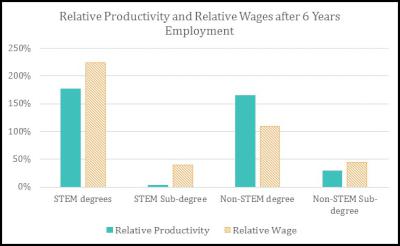Qualifications or job choice more important for recent grads?
Are qualifications or job choice more important for recent graduates?
There are ongoing debates about the right quantity and mix of science, technology, engineering and maths (STEM) skills, and about whether other skills deliver similar benefits to employers and the economy at large.
A new paper by Motu Economic and Public Policy Research Trust focuses on the early career employment and earnings dynamics of young graduates from both STEM and non-STEM disciplines.
“We’re looking at the career paths of different graduates in the six years after graduation,” said Dr David Maré, Senior Fellow at Motu and a co-author of the report. “We also estimate how well their wages match their contribution to productivity over time.”
The research looks at the following groups:
• high STEM graduates: with a bachelor degree or above in a STEM field;
• high non-STEM graduates: with a bachelor degree or above in a non-STEM field;
• low STEM graduates: who have a sub-bachelor qualification in a STEM field; and
• low non-STEM graduates: who have a sub-bachelor qualification in a non-STEM field.
“All recent graduates tend to have jobs that begin paying more highly in the first year or two after graduation,” said Dr Maré. “They also tend to move into higher paying firms and industries and larger firms, as their careers progress.”
All graduate groups start their careers with relatively high average pay. High-STEM graduates not only have the highest median earnings rate in the first year after graduation ($45,000), they also have a relatively high 49 percent growth in median earnings over their first six years post-graduation.
“STEM graduates with a Bachelor's degree or above change jobs less than other graduate groups, but are more likely to end up in high paying industries, high paying firms within industries, and larger firms,” said Dr Maré.
“Among graduates with less than a Bachelor's degree, STEM and non-STEM graduates start at around $30,300 a year, but STEM graduates’ earnings grow more strongly.”
When it comes to productivity, degree-qualified graduates become markedly more productive between the first three years after graduation and the subsequent three years. They also experience strong wage growth. Relative wages more than double for STEM graduates, and rise by around 50 percent for non-STEM graduates.
“The relative wage paid to high STEM graduates is around 25 percent higher than their contribution to productivity. In contrast, high non-STEM graduates are estimated to make a higher relative contribution to productivity, and their relative wage is lower than their relative productivity by around 34 to 41 percent,” said Dr Maré.
“What our analysis suggests is that the level of qualification tells us more about graduate outcomes than the field of study,” said Dr Maré. “However, there is almost certainly considerable variation within each group.”
The non-STEM group includes high-paid fields such as accountancy and law, as well as lower paid fields such as creative arts.”
Relative Productivity and Relative Wages
of Graduates
New Zealand’s skilled graduates are very mobile. Many go overseas; in the sixth year after graduation more than 20% of low-STEM graduates are overseas and 40% of high-STEM (and high-non-STEM) graduates have left New Zealand.
The research uses Statistics New Zealand's Integrated Data Infrastructure, an integrated data environment with longitudinal microdata about individuals, households and firms.
“Unfortunately our analysis can’t observe students who train overseas, the career outcomes of New Zealand graduates who travel overseas, or graduates who are self-employed or work in the informal sector,” said Dr Maré. “And because we’re looking at productivity variation within industries, our estimates may not reflect the impact that the changing supply of skilled workers has on the growth of innovative and knowledge-intensive sectors.”
The independent report “Productivity and the allocation of skills” by David C Maré, Trinh Le, Richard Fabling and Nathan Chappell was funded by the Productivity Hub (a partnership between the Productivity Commission, the Ministry of Business, Innovation and Employment, Statistics New Zealand and the Treasury, which aims to improve how policy can contribute to the productivity performance of the New Zealand economy and the wellbeing of New Zealanders).
Impact_on_Employment_Exec_Summary.pdf
-end-
About Motu
Motu Economic and Public Policy Research is an independent economic research institute which never advocates an expressed ideology or political position. A charitable trust, Motu is founded on the belief that sound public policy depends on sound research accompanied by well-informed and reasoned debate.
Motu is the top-ranked economics organisation in New Zealand. It is in the top ten global economic think tanks, according to the Research Papers in Economics (RePEc) website, which ranks all economists and economic research organisations in the world based on the quantity and quality of their research publications.


 Rachelle Martin & Kaaren Mathias, The Conversation: 1 In 6 New Zealanders Is Disabled. Why Does So Much Health Research Still Exclude Them?
Rachelle Martin & Kaaren Mathias, The Conversation: 1 In 6 New Zealanders Is Disabled. Why Does So Much Health Research Still Exclude Them? Athletics New Zealand: Connor Bell Breaks NZ Discus Record (Again)
Athletics New Zealand: Connor Bell Breaks NZ Discus Record (Again) Tertiary Education Union: UCOL Cuts Will Cause Lasting Damage
Tertiary Education Union: UCOL Cuts Will Cause Lasting Damage National Library Of New Zealand: Kate De Goldi Named Te Awhi Rito Reading Ambassador For Aotearoa
National Library Of New Zealand: Kate De Goldi Named Te Awhi Rito Reading Ambassador For Aotearoa Hikoi for Health: Healthcare Crisis Drives Cross-Country Protest | Hīkoi For Health Set To Begin
Hikoi for Health: Healthcare Crisis Drives Cross-Country Protest | Hīkoi For Health Set To Begin University of Auckland: New Zealand Professor's Paper Is One Of Century's Most-Cited
University of Auckland: New Zealand Professor's Paper Is One Of Century's Most-Cited